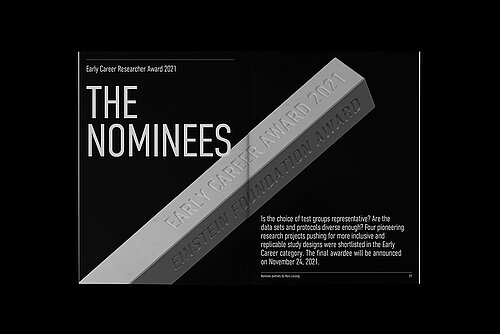
Is the choice of test groups representative? Are the data sets and protocols diverse enough? Four pioneering research projects pushing for more inclusive and replicable study designs were shortlisted in the Early Career category. The final awardee will be announced on November 24, 2021.
Nominee portraits by Nora Lessing
YURI PAVLOV
#EEGManyLabs: Making Cognitive Neuroscience More Reliable
To record electrical brain activity, or EEG, neuroscientists have been placing electrodes on the human scalp for almost 100 years. The catch: Each EEG experiment generates millions of data points and each researcher has their own way of dealing with these large and multidimensional datasets. “The consequence is that this calls into question the quality, reliability, and value of EEG research as it is currently done,” says Yuri Pavlov. To remedy this situation, the postdoctoral researcher at the University of Tübingen, Germany, and Ural Federal University, Russia, came up with the idea of #EEGManyLabs—a collaborative international effort to undertake the world’s largest EEG replication project. “Using multiple laboratories around the world and working with at least 5,000 test subjects, we will replicate 20 of the most influential EEG studies,” the psychologist explains. Subsequently, Yuri Pavlov and his colleagues will make all of their research data openly available to the community. Their goal is to generate a canonical set of reliable and trustworthy EEG data through large-scale multi-lab working practices. In this way, they hope to set the benchmark for cognitive neuroscientists for the next 100 years.
DANIELLE PEERS, LINDSAY EALES, KRISTIN SNODDON & KATIE AUBRECHT
Reimagining Disability Research Ethics
About 15 percent of the world’s population live with a disability and are therefore typically excluded from scientific research. “Research ethics protocols were put in about 50 years ago to protect disabled communities, and for good reason,” comments Danielle Peers from the University of Alberta, Canada. “In recent decades, however, disability rights have emerged and disabled folks have become researchers and community leaders. Now those protections are serving to stop the kind of work that would be meaningful to these communities.” With their project Reimagining Disability Research Ethics, Danielle Peers and her team set out to change just that: They are working to co-create studies with disabled communities and challenge existing policies to be more disability-inclusive and disability-affirming. Their vision: “Ideally, the scientific community in the future would more fully reflect to the community in general, and the kinds of methods, protocols, and world-views we use in science would represent the range and diversity of humanity.”
PATRICK FORSCHER
Leveraging Big Team Science to Expand Research in Africa
White, male, healthy, and from Europe or the United States: In terms of test subject diversity, studies in psychology tend to notoriously underperform. As results are supposed to apply around the world and culture is known to deeply impact psychological makeup, this is a pressing concern. “The problem is particularly dire in Africa, which has 17 percent of the world’s population but, according to one study, provides less than 1 percent of research samples,” says Patrick Forscher from the Busara Center for Behavioral Economics in Kenya. “The cost of this bias is hard to foresee. In any case, it’s not reasonable to presume that results from Europe and the United States can be generalized.” Patrick Forscher’s project Leveraging Big Team Science to Expand Research in Africa addresses just this problem: It will make available resources and research training across Africa, provide a database in several African languages, and establish 20 new research labs throughout the African continent. “It’s our goal to have African researchers fully participate in the academic commons. In this way, we hope to do our part to establish psychology as a field that is more robust, useful, and fair.”
MARTIN ZETTERSTEN & JESSICA KOSIE
ManyBabies5: Teaming up for Developmental Science
Unlike adult subjects, babies cannot tell you what they are thinking. Therefore, researchers studying infant development use looking patterns to understand how babies think and feel about the world. “An overwhelming majority of studies use looking time to make inferences about infant cognition,” comments Martin Zettersten from Princeton University in the United States. But what exactly is it that drives babies to pay attention to different things? To come up with a statistically sound answer to this question, he and his colleague Jessica Kosie initiated ManyBabies5, a large international consortium of infant researchers. “We aim to increase diversity amongst researchers and test subjects alike and collaboratively want to come up with the best test possible on how different factors matter in infant looking time,” Jessica Kosie explains. To that end, the ManyBabies team will put together a diverse and sizeable sample of infants around the world. “To me, team science is a useful tool for producing high quality, robust science,” says Martin Zettersten. “Embracing this approach as a field as many groups are doing right now—that feels revolutionary to me.”

